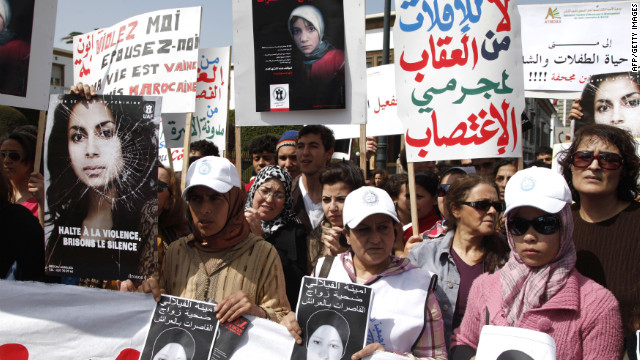Violence Against Women
Demonstrators rallied Saturday in Morocco's capital, demanding the North African nation reform its rape laws following a teenage girl's suicide after her father said a judge mandated that she marry her alleged rapist -- allowing him to stay out of jail.
Amina Filali, 16, died suddenly last week in Larache, a city in northwestern Morocco along the Atlantic coast. Her father, Lahcen Filali, told CNN that she was with her new husband when she "fell into street (and) started vomiting."
By the time an ambulance arrived, the father said, "It was already too late."
The girl died hours later at a Larache hospital.
The state-run MAP news agency reported that Amina Filali had committed suicide, the stark nature of her life and death spurring hundreds to turn out for Saturday's protest in front of the nation's parliament.
Lahcen Filali told Moroccan newspaper Hona Press that his daughter had ingested rat poison, doing so after her husband had severely beaten her.
Police told CNN only that they were investigating the teenager's death, but didn't provide further details.
Even so, the circumstances of her case have triggered outrage in Morocco, especially from women's rights advocates.
"This girl was (in essence) raped twice, the last when she was married," government spokesman Mustapha El Khalfi said Thursday, referring to the initial reported rape and the fact she was forced to marry her alleged attacker.
The girl's father said he "did not want to accept this marriage," which some have said was pushed in order to protect the family's honor. But "my wife, my family and the court of the city of Larache" wanted the union to proceed, as it did.
"The judge decided he must marry her, and I had no opportunity to refuse the judge's decision," the father said. "I wanted to send (the eventual husband) to prison, and have my daughter stay with me until she became (an adult)."
Under Moroccan law, rape is punishable by five to 10 years of prison, with a sentence as long as 20 years if the victim is a minor, pregnant or disabled. But if the victim and the rapist marry, the attacker is no longer liable.
In this case, Amina Filali's husband was never formally charged with rape due to the fact the family signed an agreement in court, according to the girl's father.
"Through this law, the rape becomes legitimate," said Fouzia Assouli, president of the Moroccan advocacy group the Federation of the Democratic League for Women's Rights, of the fact that an alleged rapist can avoid jail if he marries his victim.
That fact has stirred anger and action in Morocco, including Saturday's demonstration in Rabat, which is about 170 kilometers (105 miles) south of Larache.
Protesters held up pictures of Amina Filali, held up banners and chanted in Arabic, "Let's ... end the marriage of minors."
Moroccan law defends "family morals, but does not take into account the right of women as a person," Assouli told CNN.
"The terrible story of Amina Filali gives us more strength to move forward," she added.
Morocco's government devoted much of its weekly meeting Thursday to reviewing the case.
"We need to study in-depth the situation with the possibility of increasing the penalties as part of a reform," said El Khalfi, the communications minister. "We cannot ignore this tragedy."

Women protesting in Rabat hold posters of Amina Filali, 16,who was forced to marry the man alleged to have raped her
